

Modifying the message: how tricks masked home truths about anti-GM science. Well-established science is highly reliable and serves us well.
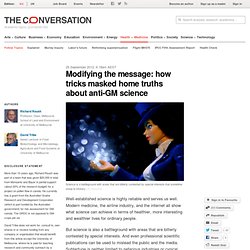
Modern medicine, the airline industry, and the internet all show what science can achieve in terms of healthier, more interesting and wealthier lives for ordinary people. But science is also a battleground with areas that are bitterly contested by special interests. And even professional scientific publications can be used to mislead the public and the media. "A rancid, corrupt way to report about science"
Imposteurs: Quand le Nouvel Observateur méprise la déontologie et ses lecteurs. Le Nobs à l'avant-garde d'une formidable opération politico-médiatique Or donc, le 19 septembre 2012, vers les 15 heures françaises, la revue Food and Chemical Toxicology mettait en ligne un article de M.
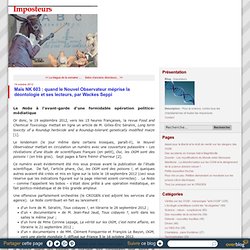
Gilles-Éric Séralini, Long term toxicity of a Roundup herbicide and a Roundup-tolerant genetically modified maize [1]. Le lendemain (le jour même dans certains kiosques, paraît-il), le Nouvel Observateur mettait en circulation un numéro avec une couverture putassière – Les révélations d'une étude de scientifiques français (en petit), Oui, les OGM sont des poisons ! (en très gros). Six Académies plaident pour museler les chercheurs et la presse. Why did Seralini block pre-publication access to his paper? One of the charges being made against Seralini's team is that they sought to manipulate media coverage of their study.
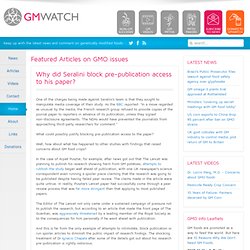
As the BBC reported: "In a move regarded as unusual by the media, the French research group refused to provide copies of the journal paper to reporters in advance of its publication, unless they signed non-disclosure agreements. The NDAs would have prevented the journalists from approaching third-party researchers for comment. " EUSJA Statement on embargoes and manipulation. The European Union of Science Journalists’ Associations (www.eusja.org) condemns the outrageous abuse of the embargo system that was perpetrated a few days ago to manipulate the press in order to get a favourable, acritical coverage of a study on the controversial and important issue of food safety in relationship to genetically modified organisms.
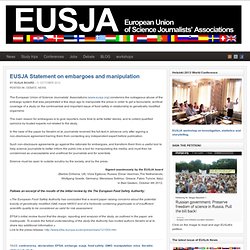
The main reason for embargoes is to give reporters more time to write better stories, and to collect qualified opinions by trusted experts not related to the study. In the case of the paper by Seralini et al, journalists received the full-text in advance only after signing a non-disclosure agreement barring them from contacting any independent expert before publication. Science must be open to outside scrutiny by the society, and by the press. Follows an excerpt of the results of the initial review by the The European Food Safety Authority: Séralini et les OGM: une déclaration de l'AJSPI. C.
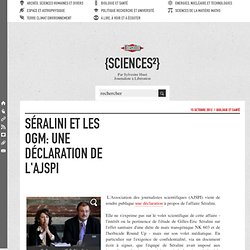
Lepage et G-E Séralini L'Association des journalistes scientifiques (AJSPI) vient de rendre publique une déclaration à propos de l'affaire Séralini. Elle ne s'exprime pas sur le volet scientifique de cette affaire - l'intérêt ou la pertinence de l'étude de Gilles-Eric Séralini sur l'effet sanitaire d'une diète de maïs transgénique NK 603 et de l'herbicide Round Up - mais sur son volet médiatique. When bad science, mass media, and luddism mix.
There’s a good reason why politics and science don’t, and shouldn’t, mix.
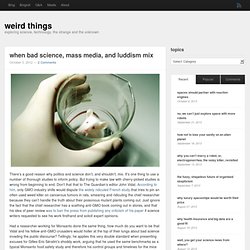
It’s one thing to use a number of thorough studies to inform policy. But trying to make law with cherry-picked studies is wrong from beginning to end. Don’t that that to The Guardian’s editor John Vidal. When doing agenda science, threaten to sue your critics. Even if those critics have not yet materialized.
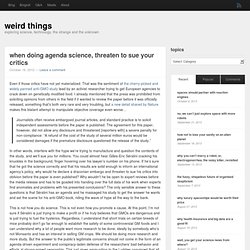
That was the sentiment of the cherry-picked and widely panned anti-GMO study lead by an activist researcher trying to get European agencies to crack down on genetically modified food. I already mentioned that the press was prohibited from soliciting opinions from others in the field if it wanted to review the paper before it was officially released, something that’s both very rare and very troubling, but a new detail shared by Nature makes this blatant attempt to manipulate objective coverage even worse… Journalists often receive embargoed journal articles, and standard practice is to solicit independent assessments before the paper is published. The agreement for this paper, however, did not allow any disclosure and threatened [reporters with] a severe penalty for non-compliance: “A refund of the cost of the study of several million euros would be considered damages if the premature disclosure questioned the release of the study.”
How to Manipulate Science Reporting. Etude Séralini : « les ficelles les plus éculées des scénarios hollywoodiens » Stenographers, anyone? GMO rat study authors engineered embargo to prevent scrutiny. A study of the effect of genetically modified corn on rats that you may have read about earlier this week doesn’t seem to have said much about whether GMOs are safe.
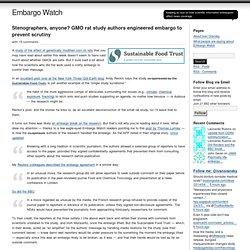
But it sure said a lot about how the scientists who did the work used a crafty embargo to control their message. In an excellent post over at the New York Times’ Dot Earth blog, Andy Revkin says the study co-sponsored by the Sustainable Food Trust, is yet another example of the “single study syndrome:” the habit of the more aggressive camps of advocates surrounding hot issues (e.g., climate, chemical exposure, fracking) to latch onto and push studies supporting an agenda, no matter how tenuous — or dubious — the research might be. Revkin’s post, and the stories he links to, do an excellent deconstruction of the small rat study, so I’ll leave that to them. It turns out there was likely an embargo break on the research. My Reuters colleagues described the embargo agreement in a similar way: So did the BBC: Update, 3:30 p.m. When good intentions go bad. Photo by Philippe Huguen/AFP/GettyImages Campaigners on important but complex issues, annoyed by the length of time required for public deliberations, often react by exaggerating their claims, hoping to push a single solution to the forefront of public debate.
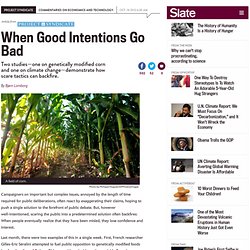
But, however well-intentioned, scaring the public into a predetermined solution often backfires: When people eventually realize that they have been misled, they lose confidence and interest. Last month, there were two examples of this in a single week. First, French researcher Gilles-Eric Séralini attempted to fuel public opposition to genetically modified foods by showing the public how GM corn, with and without the pesticide Roundup, caused huge tumors and early death in 200 rats that had consumed it over two years. Supplying an abundance of pictures of rats with tumors the size of ping-pong balls, Séralini certainly captured the public’s attention.
Comment informer de façon neutre sur les OGM ? Débat AFIS: comment informer sur les OGM? Samedi 17 novembre, dans les locaux d'AgroParisTech, les journalistes scientifiques Sylvestre Huet, de Libération, et Michel de Pracontal, de Mediapart, viendront à l'invitation de l'Afis (Association Française pour l'Information Scientifique) débattre et échanger leur point de vue sur le thème : "Comment informer sur les OGM ?
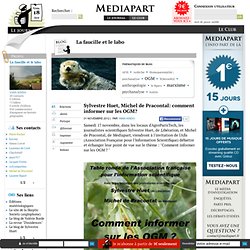
" Le traitement médiatique de la publication, le mercredi 19 septembre, d’un article de Gilles-Eric Séralini et collègues dans la revue Food and Chemical Toxicology s’est fait dans des conditions étonnantes. Avant même la publication officielle, prévue à 15h, le Nouvel Observateur titre de manière fracassante : « EXCLUSIF. Oui, les OGM sont des poisons ! ». C’est à discuter de toutes ces questions que cette table ronde Afis - AgroParisTech vous invite.